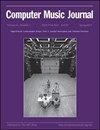IF 0.4
Q4 COMPUTER SCIENCE, INTERDISCIPLINARY APPLICATIONS
引用次数: 0
摘要
卡洛斯·安东尼奥·德·帕多瓦Chávez y Ramírez (1899-d)1978年)是20世纪墨西哥最重要的作曲家、指挥家、管理者和音乐教育家之一。1899年6月13日,Chávez出生在墨西哥城附近的波波特拉郊区,他的音乐生涯始于钢琴课,最初与曼努埃尔·庞塞一起学习。然后,在16岁时,他在墨西哥革命(1910-1920)不断变化的社会和政治环境中成为一名音乐教师。在他的一些钢琴短篇作品成功出版后,他很快收到了公共教育部长(SEP)的委托,为他创作一部芭蕾舞剧。对于这个指控,Chávez选择了一个阿兹特克传说,给他的作品贴上El fuego nuevo的标签。不幸的是,这项工作从未在墨西哥进行过,这导致Chávez寻求其他机会,首先在欧洲,然后在纽约市。Chávez与纽约市现代主义作曲家和艺术家的合作对作曲家来说是革命性的,导致了一波反映当时现代主义潮流的作品。回到墨西哥城后,Chávez担任了新的角色,包括Sinfónica Mexicana Orquesta的主任(后来被称为Sinfónica de m本文章由计算机程序翻译,如有差异,请以英文原文为准。
Carlos Chávez
Carlos Antonio de Padua Chávez y Ramírez (b. 1899–d. 1978) was one of Mexico’s leading composers, conductors, administrators, and musical educators during the 20th century. Born in Popotla, a suburb near Mexico City, on 13 June 1899, Chávez’s began his musical career with piano lessons, studying initially with Manuel M. Ponce. Then, at the age of sixteen, he became a music teacher during the changing social and political landscape of the Mexican Revolution (1910–1920). After successful publications of some of his short piano works, he soon received a commission from the Secretary of Public Education (SEP), José Vasconcleos, to compose a ballet. For this charge, Chávez chose an Aztec legend, labeling his work El fuego nuevo. Unfortunately, this work was never performed in Mexico, which led Chávez to seek other opportunities, first in Europe, then in New York City. Chávez’s collaborations with modernist composers and artists in New York City proved to be transformative for the composer, leading to a wave of compositions that reflected the modernist currents of the time. Upon returning to Mexico City, Chávez took on new roles, including the director of Orquesta Sinfónica Mexicana (later called the Orquesta Sinfónica de México), and then an appointment as the director of the Conservatorio Nacional, where he provided robust changes to the curriculum. In 1933, Chávez served as the chief of the Department of Fine Arts for the SEP and later collaborated with Paul Strand on his film project Redes (1935). His varying positions in Mexican institutions and his search for a Mexican musical identity initiated a wave of nationalism that can be heard in his works H.P. (1932) and Sinfonía India (1935) and his participation in the Twenty Centuries of Mexican Art Exhibit at the Museum of Modern Art in New York City. Later works reflected an approach to universalism and cosmopolitanism, such as the Concerto for Piano and Orchestra (1938). During the 1940s, Chávez became the director of the Instituto Nacional de Bellas Artes (INBA), which oversaw several national artistic projects in Mexico. After resigning from INBA, Chávez returned to composition and taught courses at the Conservatorio Nacional. Chávez’s musical career was eclectic and diverse, spanning several important areas of Mexican musical and artistic culture. He rose to become one of the most recognized musicians in Mexico during the 20th century.
求助全文
通过发布文献求助,成功后即可免费获取论文全文。
去求助
来源期刊

Computer Music Journal
工程技术-计算机:跨学科应用
CiteScore
1.80
自引率
0.00%
发文量
2
审稿时长
>12 weeks
期刊介绍:
Computer Music Journal is published quarterly with an annual sound and video anthology containing curated music¹. For four decades, it has been the leading publication about computer music, concentrating fully on digital sound technology and all musical applications of computers. This makes it an essential resource for musicians, composers, scientists, engineers, computer enthusiasts, and anyone exploring the wonders of computer-generated sound.
Edited by experts in the field and featuring an international advisory board of eminent computer musicians, issues typically include:
In-depth articles on cutting-edge research and developments in technology, methods, and aesthetics of computer music
Reports on products of interest, such as new audio and MIDI software and hardware
Interviews with leading composers of computer music
Announcements of and reports on conferences and courses in the United States and abroad
Publication, event, and recording reviews
Tutorials, letters, and editorials
Numerous graphics, photographs, scores, algorithms, and other illustrations.
 求助内容:
求助内容: 应助结果提醒方式:
应助结果提醒方式:


